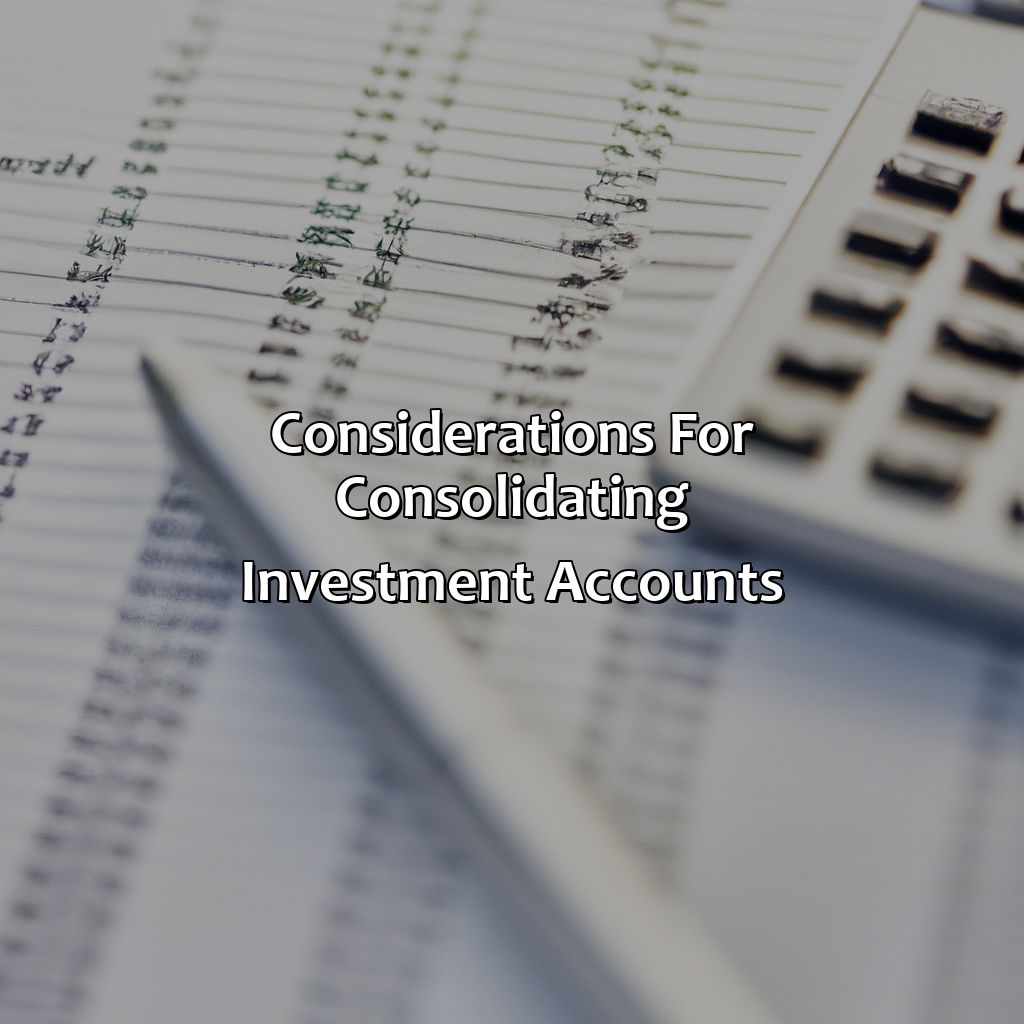How Many Investment Accounts Should I Have?
Key Takeaway:
- Diversification is a major factor in deciding how many investment accounts to have, as spreading investments across multiple accounts can minimize risk and increase potential returns.
- Tax implications should also be considered, as different types of accounts have different tax benefits and consequences.
- When deciding on the number of investment accounts to have, convenience and management should be taken into account, as managing multiple accounts can be time-consuming and may require more effort than a single account.
Do you feel overwhelmed by the idea of managing multiple investment accounts? Don’t worry, this blog will provide you with the best tips and advice to help you find the best approach for you. So, if you’re looking to make your investing journey smoother, read on to discover how many investment accounts you should have.
Factors to consider when deciding how many investment accounts to have
In deciding how many investment accounts to have, several factors should be taken into consideration.
- Firstly, consider your investment goals and the level of risk you are willing to tolerate. If your goals are diversified across multiple sectors or asset classes, multiple accounts may be necessary.
- Secondly, assess your financial situation, including your income level and tax bracket. Having multiple accounts can provide tax benefits and spread out risk across different financial institutions.
- Thirdly, take into account the fees and costs associated with managing various accounts. Consolidation may be more cost-effective, but it may also limit investment options.
- Lastly, assess your portfolio diversification. Having different types of accounts can provide access to various types of investments, but too many accounts can also lead to complexity.
It is also important to stay informed on new investment opportunities, while also understanding the risks and benefits associated with a particular investment.
Not having the appropriate amount and types of investment accounts can lead to missed opportunities for financial growth. Take the time to evaluate your situation and make any necessary adjustments to ensure long-term financial success.

Image credits: retiregenz.com by Adam Woodhock
Options for investment account types
Investment account types offer various options for investors to choose from. Based on their financial goals, risk tolerance, and tax situation, investors can select an account type that fits their investment approach.
Account Types:
| Account Type | Description |
| Individual Brokerage Account | A taxable account for individuals who want to invest in stocks, bonds, mutual funds, etc. |
| Joint Brokerage Account | A taxable account for two or more individuals who want to invest in various securities. |
| Retirement Accounts (IRA, 401k, etc.) | Tax-advantaged accounts designed for retirement savings. |
| Education Savings Accounts (529) | A tax-advantaged account created for qualified education expenses. |
| Health Savings Account (HSA) | A tax-advantaged account used for qualified medical expenses when paired with a high-deductible health plan. |
Investment account types have unique features, such as contribution limits, investment choices, and tax implications. It is essential to understand the advantages and limitations of each account type before making an investment decision.
Example: John, a retired executive, contributed the maximum amount to his traditional IRA account for many years. However, when he started taking distributions at age 70 ½, his taxable income increased, affecting his tax bracket. By understanding the tax implications of his investment choices, John could have avoided a higher tax bill during retirement.

Image credits: retiregenz.com by Harry Washington
Pros and cons of having multiple investment accounts
Investing your money in the right place is critical to financial growth, but how many investment accounts should you have is a question that puzzles many. Here are the benefits and drawbacks of having multiple investment accounts.
- Diversification: Having multiple investment accounts allows you to diversify your portfolio and reduce your exposure to risk. With multiple accounts, you can invest in different instruments and balance the risk and return.
- Tax benefits: Multiple accounts also come with tax benefits. By opening different accounts like Individual Retirement Account (IRA), 401K, and more, you can take advantage of tax deductions and save money in the long run.
- Management and fees: On the downside, having multiple accounts can be cumbersome to manage and is associated with higher fees, including account opening fees, maintenance fees, and transaction fees.
Additionally, consolidating accounts saves time and improves account management. It also simplifies the tax filing process, which can be overwhelming when filing taxes while juggling multiple accounts.
In a real-life example, Warren Buffett consolidated his personal investments into one account realizing the time and cost associated with managing multiple accounts. Buffett’s actions emphasize the importance of careful account management and investment strategy.

Image credits: retiregenz.com by Adam Duncun
Considerations for consolidating investment accounts
Consolidating investment accounts can save you time and money. Here are some factors to consider before consolidating.
Considerations for Consolidating Investment Accounts:
- Account fees and minimum balance requirements
- Investment portfolio diversification
- Tax implications of selling securities
- Cash distributions and reinvestment
- Benefits and drawbacks of different account types
- Financial advisor recommendations and guidance
Unique Details to Consider When Consolidating:
Before consolidating, consider factors such as the age of your investment accounts, performance history of securities, and potential impact on your credit score.
Suggestions for Consolidating Investment Accounts:
When consolidating, consider transferring assets to an account with lower fees and wider investment options. It’s also important to consult with a financial advisor to ensure the consolidation aligns with your financial goals. By consolidating, you can simplify your investment management process and potentially save money on fees.

Image credits: retiregenz.com by Yuval Washington
Five Facts About How Many Investment Accounts You Should Have:
- ✅ The general rule of thumb is to have no more than 3-5 investment accounts. (Source: Kiplinger)
- ✅ Having too many investment accounts can lead to confusion and lack of control over your portfolio. (Source: The Balance)
- ✅ It is important to consider factors such as fees, investment options, and account types when deciding how many accounts to have. (Source: Forbes)
- ✅ Consolidating your investment accounts can simplify your financial life and potentially reduce costs. (Source: NerdWallet)
- ✅ The best number of investment accounts for you may vary depending on your individual financial goals and circumstances. (Source: Investopedia)
FAQs about How Many Investment Accounts Should I Have?
How many investment accounts should I have?
There’s no right or wrong answer to this question as it will depend on your personal financial situation. However, here are six frequently asked questions to consider when determining how many investment accounts you should have.
Can I have multiple investment accounts with the same brokerage firm?
Yes, most brokerage firms allow you to have multiple investment accounts. This can include individual accounts, joint accounts, retirement accounts, and more. Having multiple accounts with the same brokerage firm can be convenient for managing your investments and keeping track of your portfolio.
What are the benefits of having multiple investment accounts?
Having multiple investment accounts can provide diversification in your portfolio and help you meet your financial goals. For example, you may have one account dedicated to retirement savings, another for short-term savings goals, and another for long-term investments. Having multiple accounts can also provide greater flexibility in your investment strategy.
Is there a downside to having too many investment accounts?
Having too many investment accounts can make it difficult to manage your portfolio effectively. It can also lead to higher fees and expenses if you’re not careful. Some investors may also find it overwhelming to keep track of multiple accounts and may be prone to making investment mistakes.
Can having multiple investment accounts impact my credit score?
No, having multiple investment accounts typically does not impact your credit score. Your credit score is based on your credit history and financial behavior, not your investment accounts.
How can I determine the right number of investment accounts for me?
Consider your investment goals and financial situation when determining how many investment accounts you need. You may want to consult with a financial advisor for guidance on developing an investment strategy that works best for you.


